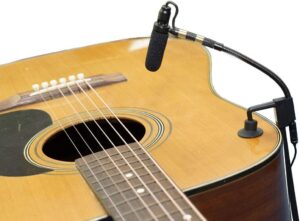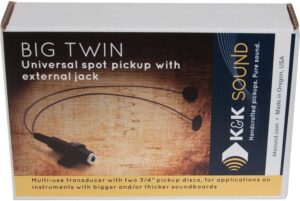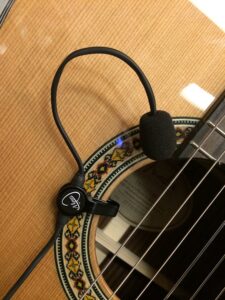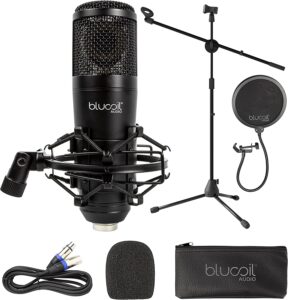Are you looking for the best mic for your acoustic guitar in 2023? If so, you’ve come to the right place! In this blog, we’ll be breaking down all the factors you need to consider when choosing the perfect mic for your acoustic guitar. Read on to find out what it takes to get the most out of your acoustic recordings!
Best mics for acoustic guitar 2023
- Alomejor Guitar Acoustic Microphone (Editor’s Pick)
- AV-JEFES PMM19B-H4P-GT Guitar Microphone (Best Overall)
- K & K Microphone for Acoustic Guitar (Budget Friendly)
- Blucoil Cardioid Microphone for Acoustic Guitars
- Guitar Microphone Myers Pickups
- Samson C02 Condenser Microphone
- Blucoil Cardioid Microphone for Acoustic Guitars
1) Alomejor Guitar Acoustic Microphone 
The Alomejor Guitar Acoustic Clip On Pickup Microphone is ideal for acoustic guitar players looking to improve their sound. This microphone’s features improve sound quality and ease of use to enhance your musical performance. Join us as we examine the fine features that make the Alomejor pickup microphone essential for acoustic guitar amplifiers.
Release Your Musical Potential Easy Clip Design Attachment
The Alomejor Guitar Acoustic Clip On Pickup Microphone’s revolutionary clip design makes guitar attachment easy. This secures and simplifies your instrument connection, letting you focus on your performance. This microphone’s clip construction ensures a smooth performance on stage or in the studio.
Sound Precision using Unidirectional Polar Pattern
The microphone’s unidirectional polar arrangement reduces background noise and ensures clear sound. This precise sound capture lets your acoustic guitar’s unique tone shine through, allowing you to perform with authenticity and clarity.
Designed for Quality Accurate Sound Reproduction with Condenser Mic Element
The Alomejor Guitar Acoustic Clip On Pickup Microphone uses a high-quality condenser mic. This element correctly captures your guitar’s tone, even when amplified. A balanced blend of boosted sound and original character boosts performance.
Auxiliary Technology Connectivity Made Easy
The microphone’s auxiliary connector makes connecting to amplifiers or mixers easy. This tool lets you collaborate and record to exhibit your musical talent. The Alomejor pickup microphone opens the door to musical collaboration and innovation.
Elevate Your Sound with Alomejor Guitar Acoustic Clip-On Pickup Microphone
The Alomejor Guitar Acoustic Clip On Pickup Microphone enhances sound. This microphone, designed for musicians, delivers unmatched simplicity, quality, and performance.
Conclusion
Every note matters in music, and the Alomejor Guitar Acoustic Clip On Pickup Microphone ensures your acoustic guitar sounds clear and true. With its effortless attachment, precise sound capture, and auxiliary connectivity, this microphone enhances your music. Improve your performances, originality, and sound with the Alomejor Guitar Acoustic Clip On Pickup Microphone. Alomejor combines innovation and quality—experience it today.
Must Read – Best gig bag for acoustic guitar
Alomejor Guitar Acoustic Microphone First Hand Review Video
Video Source: This is Classical Guitar
Pros:
- Lightweight design (1.13 ounces) makes it easy to carry
- Unidirectional polar pattern ensures clear and precise sound quality
- Clip-on feature allows for easy installation and removal
- Durable plastic and metal material for long-lasting use
- Black color adds a touch of elegance to the guitar.
CORE FEATURE
| Brand | Alomejor |
| Connectivity Technology | Auxiliary |
| Special Feature | Clip |
| Color | Black |
| Polar Pattern | Unidirectional |
2) AV-JEFES PMM19B-H4P-GT Guitar Microphone
AV-JEFES PMM19B-H4P-GT Guitar Clip-On Musical Instrument Microphone is a top choice for guitar amplifiers. This microphone’s features ensure high-quality sound and ease of use to enhance your musical experience. Discover the characteristics that make the AV-JEFES microphone a worthwhile complement for guitarists looking to improve their sound.
The clip-on design allows for easy attachment and unlocks your musical potential.
AV-JEFES PMM19B-H4P-GT instrument Microphone’s clip-on design makes instrument attachment easy. This simple function assures a secure and easy connection, letting you focus on your performance. This microphone’s clip-on design ensures a smooth performance on stage, in the studio, or at home.
Improved Isolation with Unidirectional Polar Pattern
The microphone’s unidirectional polar design minimises background noise and catches sound from one direction. Precision in sound capture ensures clean and focused sound, allowing you to highlight your guitar’s exquisite performance.
Made for Quality
XLR Connectivity is Smooth
AV-JEFES PMM19B-H4P-GT Guitar Microphone uses XLR interface for convenient and stable hookups to amplifiers or mixers. This function allows seamless collaboration and recording, expanding your musical options. The XLR connector makes this microphone useful for musicians because it works with many audio equipment.
Perfect for Recording and Performance
This microphone is ideal for live performances and recording with a 48 dB audio sensitivity and 800 ohm impedance. The AV-JEFES microphone accurately captures your guitar’s sound on stage or in the studio.
Improve Your Sound with the AV-JEFES PMM19B-H4P-GT Guitar Microphone
The AV-JEFES PMM19B-H4P-GT Guitar Clip-On Microphones become vital to your musical journey, boosting your sound and increasing your creative horizons.
Conclusion
Precision and quality matter in music, and the AV-JEFES PMM19B-H4P-GT Guitar Microphone delivers clear, realistic guitar sound. With its clip-on construction, unidirectional polar pattern, and XLR connector, this microphone enhances sound. Make music, record performances, and release your creativity with the AV-JEFES PMM19B-H4P-GT Guitar Clip-On Musical Instrument Microphone. Discover the AV-JEFES advantage—innovation and quality together.
Must Read – Best left handed acoustic guitar
AV-JEFES PMM19B-H4P-GT Guitar Microphone First Hand Review Video
Video Source: B&H Photo Video
Pros:
- Lightweight design (2 ounces) makes it easy to carry
- Unidirectional polar pattern ensures clear and precise sound quality
- Clip-on feature allows for easy installation and removal
- XLR connectivity technology allows for easy connection to amplifiers and mixers
- High audio sensitivity (48 dB) ensures that even the softest sounds are picked up
CORE FEATURE
| specifications | Clip |
| specifications | Product Weight |
| Brand | AV-JEFES |
| Connectivity Technology | XLR |
| Connector Type | XLR Connector |
3) K & K Microphone for Acoustic Guitar
The K & K Microphone for Acoustic Guitar is the pinnacle of perfection designed to enhance your playing experience. This microphone is designed for acoustic guitars and offers great sound and ease. Join us as we explore why artists seeking to improve their acoustic sound need the K & K microphone.
Release Authentic Sound
XLR Connectivity for Precision
The K & K Microphone for Acoustic Guitar uses XLR connections for a safe connection. You can focus on your performance without interruptions since sound flows smoothly. This microphone’s stable connectivity helps you play on stage or in the studio.
Sound Precision using Unidirectional Polar Pattern
The microphone’s unidirectional polar design collects sound only from the front, reducing background noise. This precise sound capture reproduces your acoustic guitar’s original tone for a clear, accurate performance.
Made for Excellence
Double Sensors Increase Sensitivity
The K & K Microphone for Acoustic Guitar has two 20-mm sensors. This increased sensitivity to acoustic nuances captures every note and chord accurately. The sound quality reflects your acoustic purity.
Simplified Setup, High Output
he microphone’s high output eliminates the need for a preamp, simplifying your setup. This simplicity lets you focus on your music without extra equipment, improving your performance.
Increase Your Acoustic Guitar Sound with the K & K Microphone
The K & K Microphone for Acoustic Guitar captures your acoustic guitar’s true sound, transcending a microphone.
Conclusion
In music, catching your instrument’s sound is crucial, and the K & K Microphone for Acoustic Guitar captures it clearly and authentically. With its increased sensitivity, unidirectional polar pattern, and easier setup, this microphone lets you express yourself musically. The K & K Microphone for Acoustic Guitar enhances your performance, originality, and sound quality. Try the K & K advantage today—innovation and excellence together.
Must Read – Best Martin Acoustic Guitar
K & K Microphone for Acoustic Guitar First Hand Review Video
Video Source: Acoustic Life
Pros:
- Highly sensitive double sensors (20 mm) pick up even the softest acoustic sounds
- External mounting system is easy to install and does not require a preamp
- Unidirectional polar pattern ensures clear and precise sound quality
- XLR connectivity technology allows for easy connection to amplifiers and mixers
- Compact and lightweight design makes it easy to carry and transport
CORE FEATURE
| specifications | Double sensors 20 mm |
| specifications | External mounting |
| specifications | Does not require the use of a preamp |
| Brand | K & K |
| Connectivity Technology | XLR |
4) Blucoil Cardioid Microphone for Acoustic Guitars
The Blucoil Cardioid Condenser Studio XLR Microphone captures the rich, realistic sound of an acoustic guitar well. This microphone is versatile and used in recording studios and live performances to enhance acoustic melodies. Let’s explore its top-tier characteristics for musicians seeking superior sound reproduction.
Clarity and Cardioid Precision
The cardioid polar pattern powers the Blucoil microphone. This clever design reduces background noise, letting the microphone focus on your favourite acoustic guitar. Every element is recorded with precision and clarity, whether you’re strumming soft chords or releasing passionate songs.
Secure Connection, Easy Placement
The Blucoil Cardioid Condenser Studio Microphone’s XLR connector is designed for ease and provides a stable connection to your recording setup or sound system. This guarantees uninterrupted performance, letting you fully enjoy your music. The provided clip lets you easily mount the microphone on your guitar or stand for best sound capture.
Unleash Versatility
The Blucoil microphone excels in acoustic guitar capture, but its adaptability is limitless. In addition to its sonic perfection, this microphone responds to different musical aspects. This microphone delivers consistent and excellent sound quality across numerous applications, whether you’re recording vocals, percussion, or instruments.
Enhancing Your Setup with Style and Durability
The Blucoil Cardioid Condenser Studio XLR Microphone is made of durable alloy steel. This design protects its life and improves its performance after many recording sessions or live events. The microphone’s sleek black appearance enhances any musical setting.
An Affordable Gem without Compromise
The Blucoil microphone offers quality at an affordable price. It’s great for budget-conscious musicians seeking high-quality sound. This microphone increases your creativity with USB and XLR connectivity. It proves that high-quality sound reproduction is accessible to anyone.
Blucoil Cardioid Condenser Studio XLR Microphone revolutionises acoustic guitar melody capture. It empowers musicians to express their craft honestly with its cardioid precision, versatility, and quality and affordability. A microphone that shares your passion for sound will elevate your song.
Must Read – Best Martin Acoustic Guitar
Blucoil Cardioid Microphone for Acoustic Guitars First Hand Review Video
Video Source: Alberto Martinez Del Rio Guitar
Pros:
- Reproduces clear and natural sounds, ideal for recording or performing live
- Rejects background noise from the rear, ensuring precise and clear sound quality
- Versatile device that can be used for different applications
- Lightweight design (1 pound) makes it easy to carry and transport
- XLR connectivity technology and clip feature make it easy to connect to audio interfaces and mixers
CORE FEATURE
| specifications | REPRODUCES CLEAR NATURAL SOUNDS |
| specifications | REJECTS BACKGROUND NOISE FROM THE REAR |
| specifications | CAN BE USED FOR DIFFERENT APPLICATION |
| specifications | REQUIRES 48V PHANTOM POWER |
| specifications | INCLUDES |
5) Guitar Microphone Myers Pickups
For musicians seeking an exceptional tool to amplify the soulful melodies of their guitars, the Myers Pickups Guitar Microphone emerges as a game-changer. Crafted to enhance your guitar’s sound with precision and clarity, this microphone stands as a testament to innovation and reliability. Let’s delve into the remarkable features that make this microphone an indispensable companion for guitarists who demand nothing short of sonic excellence.
Unveiling Versatility and Compact Brilliance
The Myers Pickups Guitar Microphone is not merely a device; it’s a versatile masterpiece that redefines guitar sound. Compact yet powerful, it seamlessly integrates into your musical setup, capturing the true essence of your guitar’s melodies. The microphone’s auxiliary connectivity technology empowers you to effortlessly incorporate it with your existing audio equipment, ensuring a seamless and hassle-free integration process.
Omnidirectional Precision for Immersive Sound
When it comes to capturing the nuances of your guitar’s sound, the omnidirectional polar pattern of the Myers Pickups Microphone reigns supreme. It ingeniously captures sound from all directions, embracing every note, strum, and pluck with utmost clarity. Whether you’re creating an intimate studio recording or igniting the stage with a live performance, this microphone ensures that your guitar’s voice resonates authentically.
Powerful and Reliable Performance
Uncompromising performance is the heart of the Myers Pickups Guitar Microphone. With a corded electric power source and the backing of two lithium metal batteries, this microphone guarantees stability and reliability throughout your musical journey. Say goodbye to unexpected interruptions and hello to seamless, uninterrupted sound amplification that empowers your guitar to shine.
Crafted for Comfort and Durability
The rubber material that envelopes the microphone is more than just a design choice; it’s a testament to durability and comfort. The microphone fits snugly in your hand, granting you an ergonomic grip that allows you to focus solely on your music. The 78 dB signal-to-noise ratio further elevates your sound output, ensuring that every note you produce is delivered with impeccable clarity.
Simplicity Meets Excellence
Ease of use is a cornerstone of the Myers Pickups Guitar Microphone. With its built-in highly sensitive omnidirectional pickup and single channel, this microphone streamlines your experience. Whether you’re a seasoned performer or a budding artist, this microphone eliminates technical complexities, allowing you to concentrate solely on the art of your guitar’s melodies.
In conclusion, the Myers Pickups Guitar Microphone is a testament to the harmonious fusion of innovation and musicality. Its gooseneck form factor positions it perfectly to capture the essence of your guitar’s sound. With its compact design, corded electric power, and unwavering reliability, it’s a tool that amplifies your passion and talent. Elevate your guitar’s voice with a microphone that’s designed to honor and enhance your musical journ
Must Read – Best nylon strings for acoustic guitar
Guitar Microphone Myers Pickups First Hand Review Video
Video Source: Jkskks Jkokksn
Pros:
- Omnidirectional polar pattern picks up sound from all directions
- Gooseneck form factor allows for optimal microphone placement
- Easy to use and does not require any technical knowledge or special tools
- Lightweight design (5.5 ounces) makes it easy to carry and transport
- Compact package dimensions make it easy to store when not in use.
CORE FEATURE
| specifications | Instrument NOT Included |
| Brand | Myers Pickups |
| Connectivity Technology | Auxiliary |
| Color | Black |
| Polar Pattern | Omnidirectional |
6) Samson C02 Condenser Microphone
For musicians and audiophiles seeking top-notch sound, the Samson C02 Pencil Condenser Microphone is unmatched. This microphone is precise and versatile, designed for recording and live sound applications. Explore the astonishing characteristics that make this microphone a must-have for acoustic clarity.
Boosting Performance Using Technology
The Samson C02 Microphone is a flexible powerhouse for music recording and live performances. Designed for professional use, its XLR connector technology seamlessly integrates with a wide range of audio equipment, improving your sound experience. The XLR connector strengthens its interoperability with many audio systems.
Unearthing Sound Nuances
With an amazing 112dB dynamic range, the Samson C02 Microphone captures sound details with precision. This accurately reproduces even the smallest audio details, letting your recordings breathe. The mic’s 22dB-A self-noise keeps recording clean, letting your music shine.
Promoting Diverse Soundscapes
The Samson C02 Microphone works well with everything from acoustic guitars to thunderous drum rhythms. It preserves the spirit of each instrument with astonishing clarity at -40dB/Pa (10mV/Pa). Its 134dB SPL handling ensures that even the loudest performances be conveyed without distortion.
A Visual and Audio Wonder
The Samson C02 Microphone’s silver colour conveys professionalism and style. The microphone’s unidirectional polar design reduces background noise and produces high-quality sound. This architecture makes it better for live and controlled recording.
Designed for Style and PortabilityThe
Samson C02 Microphone is stylish and functional. It’s a lightweight, portable tool for musical endeavours at 1 pound. This microphone’s linear frequency response and polar pattern let it capture crisp, detailed sounds in numerous applications.
Samson C02 Pencil Condenser Microphone transcends sound with precision, adaptability, and durability. It enhances your musical interpretations with its wide dynamic range, excellent sensitivity, and authenticity. This microphone delivers clear, precise sound whether you’re recording in the studio or performing live. A high-quality microphone will enhance your sound.
Must Read – Best acoustic 12 string guitar
Samson C02 Condenser Microphone First Hand Review Video
Video Source: Kagan
Pros:
- Offers accurate sound reproduction, making it ideal for recording music
- Captures crystal-clear sound, making it a versatile tool for different instruments
- Can handle loud sound sources exceptionally well
- XLR connectivity technology allows for easy connection to speakers, mixers, and other audio devices
- Reduced P-popping ensures clear and free sound quality.
CORE FEATURE
| specifications | OFFERS ACCURATE SOUND REPRODUCTION |
| specifications | CAPTURES CRYSTAL |
| specifications | EXCEPTIONALLY HANDLES LOUD SOUND SOURCES |
| specifications | OFFERS REDUCED P |
| specifications | INCLUDES |
7) Blucoil Cardioid Microphone for Acoustic Guitars
The Blucoil Cardioid Condenser Studio XLR Microphone is versatile and precise for artists and audiophiles who want to capture sound’s essence. This microphone showcases innovation in audio capture to enhance acoustic guitars, woodwind instruments, and vocals. Let’s explore its outstanding qualities that make it a musician, recording engineer, and podcaster mainstay.
A Versatility Symphony
The Blucoil Microphone is a multifunctional marvel that elevates audio. Customised to capture the beauty of acoustic guitars, woodwinds, and vocals, its capabilities go beyond reproduction. The cardioid polar pattern focuses on the main sound source, capturing every strum, note, and breath with incredible clarity.
Unmatched Audio Quality
The Blucoil Microphone’s sonic quality is its greatest strength. The low-mass diaphragm and 36 dB sensitivity capture every detail of your performance. The Blucoil Microphone maintains your sound whether you’re arranging a string symphony or sharing your voice.
A Full Studio Set
The Blucoil Microphone is a comprehensive studio solution with required accessories. The package includes an XLR cable, shock mount, windscreen, and carrying case. These features improve recording and make transit and storage easier. This mic extends your creative process, ensuring you’re always ready to capture sonic genius.
Smooth Connection for Creative Freedom
The Blucoil Microphone is limitless. It easily fits into many audio interfaces and mixers with USB and XLR connectivity. This independence lets you experiment with music, vocals, and podcasts.
Elegance meets utility
With painstaking attention to detail, the Blucoil Microphone is elegant and useful. Its 1 x 1 x 1 inch size and 1-pound weight make it easy to carry on your musical journey. This microphone is an extension of your work, not just a tool.
In conclusion, the Blucoil Cardioid Condenser Studio XLR Microphone revolutionises sound capture and experience. Its ability to capture the nuances of instruments and vocals makes it an aural jewel. With accessories that streamline recording and connectivity possibilities that encourage creativity, this microphone lets you express yourself. Improve your sound with a microphone that captures your music’s spirit with unmatched precision.
Must Read – Best gig bag for acoustic guitar
Blucoil Cardioid Microphone for Acoustic Guitars First Hand Review Video
Video Source: Michael Watts
Pros:
- Reproduces clear and natural sounds, ideal for recording or live performances
- Rejects background noise from the rear, ensuring precise and clear sound quality
- Versatile device that can be used for different applications
- Lightweight design (1 pound) makes it easy to carry and transport
- XLR connectivity technology and connector type make it easy to connect to audio interfaces and mixers
CORE FEATURE
| specifications | REPRODUCES CLEAR NATURAL SOUNDS |
| specifications | REJECTS BACKGROUND NOISE FROM THE REAR |
| specifications | CAN BE USED FOR DIFFERENT APPLICATION |
| specifications | REQUIRES 48V PHANTOM POWER |
| specifications | INCLUDES |
Best mics for acoustic guitar 2023-Complete Buying Guide
Acoustic guitars have both a different sound and form factor from electric guitars, so it is important to choose microphones that are designed specifically for them. This guide will provide an introduction to the best acoustic guitar mics that are available in the market for 2023. We will go through the features of each one, so you can decide which microphone is best suited to your needs.
Apart from understanding their features, it’s important to consider where in the room and how close or distant you need to place your mic in order to achieve the sound quality you desire. Each setup requires an optimal distance between mic and sound source as well as placement of mic relative to other instruments in your recording space. Knowing what type of mic and how best to use it are key components of achieving great recordings with an acoustic guitar:
- Placement of the mic
- Positioning of the mic relative to other instruments
- Distance between mic and sound source
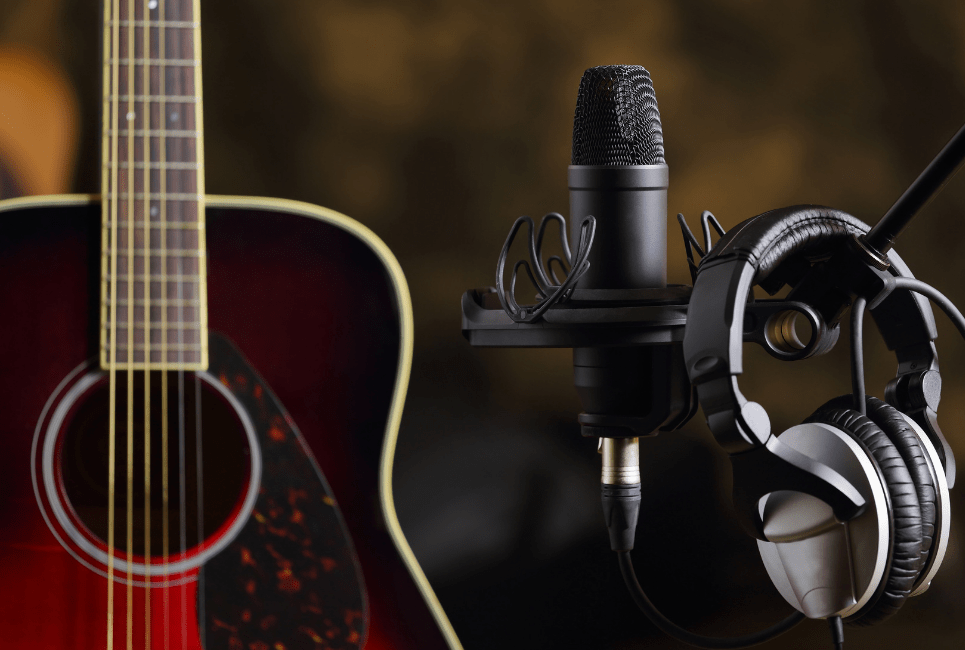
Photo Source: guitarspace.org
Different Types of Acoustic Guitar Mics
Although there’s no one-size-fits-all answer when it comes to the best microphones for recording acoustic guitar, you need to know the different types of mics that are available. Each microphone will have its own set of pros and cons, but certain types may be better suited than others depending on your recording setup and the sound you are trying to achieve.
- Condenser Mics – Condenser mics are generally considered to be the best choice for recording acoustic guitar. They have a wider frequency response and higher sensitivity than dynamic mics and can handle louder sounds without distorting. However, condenser mics require phantom power to operate, making them more expensive than dynamic microphones.
- Dynamic Mics – Dynamic mics tend to be less sensitive than condensers but are still capable of producing high quality recordings. They don’t require additional power and are better suited for more budget friendly studios.
- Ribbon Mics – Ribbon mics offer a smooth, vintage sound that is especially well suited for certain genres like blues or folk music. They tend to be less sensitive than other microphone types, but they also tend to cost more money due to their delicate design and construction.
Different Shapes – In addition to different mic types, there also various shapes or patterns that will affect how a microphone picks up sound from a source such as an acoustic guitar. The most common polar patterns are cardioid (which picks up sound directly in front of the mic), omni (which picks up sound all around the mic) and figure 8 (which picks up two sources at once). Ultimately, there’s no single “right” microphone for any acoustic guitar player –the best choice will depend on your particular situation as well as personal preference – so make sure you do your research before investing in something you might not love!
What to Look for When Buying an Acoustic Guitar Mic
When you’re searching for the right acoustic guitar mic, there are several key factors to consider before making your purchase. Here are some of the primary considerations to bear in mind:
- Pickup Pattern – The pickup pattern helps determine an acoustic guitar mic’s sound. A cardioid (unidirectional) pattern picks up sound from just one side, which is ideal for recordings in which only one part needs to be isolated in a mix. An omnidirectional pattern picks up sounds equally from all directions, so it works better in live performances where musical nuances may get lost with a directional mic. There’s also the figure-8 polar pattern (also called bidirectional), which captures sound from both sides but not the front or back—a useful feature when recording two closely spaced instruments at once.
- Frequency Response – The frequency response indicates how different mic models handle volume levels and ranges in different frequencies and how they will affect your recording results. Generally speaking, mics with wider frequency responses can capture more low and high frequencies while narrower frequency models “shape” recorded sounds, allowing you select ceratin ones that best match your particular playing style or type of guitar being recorded.
- Mic Sensitivity – Acoustic guitar mics can differ dramatically when it comes to sensitivity—the ability of the mic to pick up different volumes depending on how loud or soft a person plays their instrument or vocalizes their lyrics. Mics that are too sensitive may pick up unwanted ambient noise during quieter passages while mics that aren’t sensitive enough might miss out on subtle playing techniques like finger-picking or flat picking techniques due to its poor sensitivity rating for quieter acoustic stringed instruments—leading to an overall thinner sound than desired.
Top Acoustic Guitar Mics of 2023
When picking out a microphone for acoustic guitar, there is no one-size-fits-all answer. The model you should purchase depends on a variety of factors, including the sound you’re aiming for, the type of acoustic guitar you own, your budget and the environment in which you’ll be using it. From affordable dynamic models to high-end condenser microphones, there are an abundance of options available. To make sure it’s easier to pick the right mic for your needs, we’ve compiled a list of some of the top acoustic guitar mics of 2023.
- Dynamic Microphones: A great option for rock and blues styles, dynamic microphones often provide better sound isolation than condenser models. These microphones offer good gain before feedback and often come at an affordable price point. Popular dynamic microphones used for recording acoustic guitars include the Shure SM57 and SM58 as well as the Sennheiser e602 II or MD 421 II.
- Condenser Microphones: If you’re looking for pristine larger-than-life tones or want to record an orchestra with your microphone, then opt for a condenser microphone. Condensers usually have greater frequency response than their dynamic counterparts but require phantom power from an external source (usually there’s one built into the mixing board). Examples include Neumann’s U87 or U47fet as well as Rode’s NT1A or NT2A mics.
- Ribbon Microphones: Popular among jazz musicians due to their natural warm character and wide frequency response capabilities, ribbon microphones are ideal for recording detailed instruments such as strings or electric piano without having to crank up the gain too much on your rig resulting in unwanted noise levels on your recordings. The Royer R121 is one such beloved mic that delivers superb transient speed and outstanding performance when recording acoustic guitars and other delicate sources in studios or live venues alike!
Benefits of Using an Acoustic Guitar Mic
When plugged into an amplifier, acoustic guitars can produce loud, full-bodied sounds. But to maximize this effect and truly capture the instrument’s critical nuances and tonal properties, using a microphone (often referred to as an “acoustic guitar mic”) is essential.
Using a mic creates a much more dynamic range of sound than just a direct or amp output, offering greater control of volume levels during recording or performance. Additionally, modern mics feature integrated noise reduction controls so that the sound coming from the amp is clear and free from any external noise.
In addition to improved clarity and sensitivity, acoustic guitar mics provide protection against feedback – those unpleasant loud screeches you often hear on stage – by isolating the critical frequencies that can cause feedback in an environment with other instruments.
Finally, mics offer some great versatility when it comes to amplifiers; they allow you to:
- Adjust gain levels without distorting the signal
- Provide a selection of tone-shaping tools such as equalizers and compressors for further customizing your sound.
Common Questions About Acoustic Guitar Mics
When looking for the best mic for acoustic guitar, there are a few common questions you should keep in mind. Here are some of the most important queries that you must address before making your purchase:
- What type of mic is best for capturing the sound of an acoustic guitar?
Different types of mics can provide different levels of clarity for acoustic guitar recordings. Large diaphragm condenser mics are typically preferred due to their ability to capture an evenly balanced frequency response, while dynamic mics may also be appropriate depending on your instrument and playing style.
- Does it matter if my microphone is cardioid or omni-directional?
Cardioid mics pick up sound from a directional source, while omni-directional mics pick up sound equally from all directions – so it’s mostly down to personal preference and what type of sound you’re trying to capture. Both types have their advantages and disadvantages, so experiment with both before making a purchase decision.
- Is there any benefit in having a mic specifically designed for acoustic guitars?
There are some microphones specially designed for recording acoustic guitars which usually offer greater clarity and detail – as well as features like low handling noise and feedback rejection – than traditional microphones would provide.
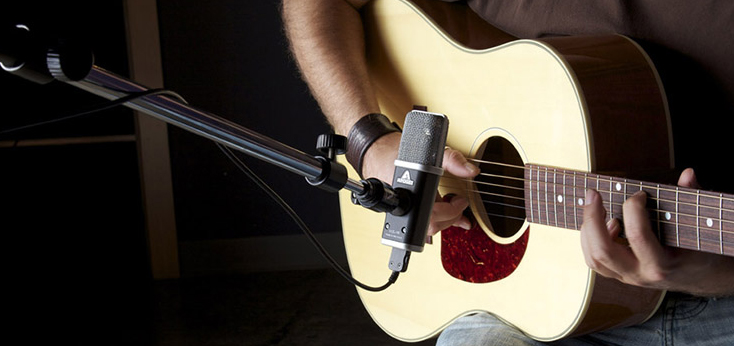
Photo Source: wirerealm.com
Tips for Getting the Best Results with Your Acoustic Guitar Mic
One of the most important aspects of any acoustic guitar recording is getting the perfect signal from your mic. The goal is to capture the pure tone of your guitar without introducing any additional noise or distortion into the mix. To achieve this, there are a few key tips you should follow when setting up and using an acoustic guitar mic.
First, consider what type of microphone you are using. Dynamic mics are great for picking up high volume playing with minimal effort, but require more work to shape and control the sound than condenser mics, which provide a greater degree of detail in their recordings. Condenser mics also tend to be more expensive, so it’s important to weigh both sound quality and cost when making your choice.
Secondly, placement is crucial for capturing the best sound from your guitar. For best results, position two mics in an X-Y pattern over the neck/soundhole area to capture both string and body resonance; one should be slightly closer than the other for fuller recordings. You should also experiment with using one or two room mics for added depth and smoothness; try placing one at each corner of an inside room wall for a natural stereo effect.
Finally, use EQ settings on your mixing console if necessary to boost certain frequencies or reduce unwanted background noise. Be careful not to add too much gain as this can lead to harshness in the higher frequencies and clipping in low frequencies—which can lead to muddy recordings overall. If you’re unsure how much gain/equalization is enough (or too much), listen closely as you adjust each parameter until you find a balance that fits with what you want out of your acoustic recording session.
Final Thoughts on Choosing the Best Acoustic Guitar Mic for 2023
Choosing the best acoustic guitar mic for 2023 comes down to your personal preferences and needs. What sounds good to you might not sound good for another person. Consider the type of music you typically play, whether or not you need a mic for studio recording, and the inputs on your PA system or digital recorder before making a final decision.
Always compare the features and specifications of multiple mics before buying one. The quality of sound capture can vary greatly from one microphone model to another based on type, design, and even price range. Consider what accessories like shockmounts, windscreens and stands are included as these items will also play a factor in how satisfied you’ll be with your purchase. Above all else take some time to listen to samples produced by each mic so you know exactly what kind of output you can expect when connected to an amplifier or audio interface.
FAQ
What is the best microphone for acoustic guitar and vocals?
The Shure SM58 and the Audio-Technica AT2020 are both popular choices for capturing the sound of an acoustic guitar and vocals.
What type of mic is best for guitar?
A condenser mic is often considered the best type of mic for guitar.
What is the best mic in 2022?
It is difficult to determine the best mic in 2022 without knowing the specific context and needs of the recording.
What microphone should you use to capture the audio of someone playing an acoustic guitar?
A condenser mic is typically recommended for capturing the sound of an acoustic guitar.
Is a dynamic or condenser mic better for guitar?
Both dynamic and condenser mics can be used for guitar, and the best choice depends on the specific needs of the recording.
What is the 3 to 1 rule for placing microphones?
The 3 to 1 rule refers to the recommended distance between two microphones in order to avoid phase cancellation.
Can you use a Shure SM57 for acoustic guitar?
Yes, a Shure SM57 can be used to record an acoustic guitar.
What type of microphone has excellent sound quality?
A large-diaphragm condenser microphone is known for its excellent sound quality
How Many mics does it take to record an acoustic guitar?
The number of mics needed to record an acoustic guitar can vary depending on the specific setup and desired sound. Typically one or two mics are used.
What mic did Eddie Van Halen use?
Eddie Van Halen was known for using a Shure SM57 microphone for his guitar amplifiers.

John Frary is an author, musician, and CEO of theacousticguitar.com dedicated to providing comprehensive and unbiased reviews of acoustic guitars and equipment. With decades of experience in the music industry, John is a trusted authority on all things related to guitars. He is committed to helping guitar enthusiasts of all levels find the perfect instrument and gear for their needs. Through his website and books, John shares his knowledge and expertise to help others achieve their musical goals.


